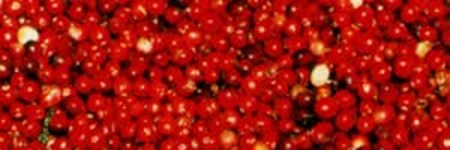Cranberry
DEFINITION
Cranberry is a type of fruit that comes from the plant species
Vaccinium.
Vaccinium.
DESCRIPTION
Cranberries grow on small, evergreen shrubs whose flowers vary
from pink to purple and bloom between May and August. The berries
are harvested and crushed to form a juice. The juice of the
Cranberry contains organic acids, carbohydrates, vitamin C, vitamin
A and phosphorus. Cranberry is a sweet-tasting berry that is used
for making jams, preserves and juices. Cranberries were
traditionally used to treat a wide range of medical complaints but
are now used primarily for urinary tract infection.
from pink to purple and bloom between May and August. The berries
are harvested and crushed to form a juice. The juice of the
Cranberry contains organic acids, carbohydrates, vitamin C, vitamin
A and phosphorus. Cranberry is a sweet-tasting berry that is used
for making jams, preserves and juices. Cranberries were
traditionally used to treat a wide range of medical complaints but
are now used primarily for urinary tract infection.
INTERACTIONS
Herbal supplements can alter the effects of certain drugs,
including prescription medications. Always tell your Doctor about
any prescription medications, non-prescription medications, herbs
or other dietary supplements you are taking.
including prescription medications. Always tell your Doctor about
any prescription medications, non-prescription medications, herbs
or other dietary supplements you are taking.
- Cranberry juice may increase the absorption of proton pump
inhibitor drugs (medications for stomach ulcer) by making the
stomach more acidic. - Due to its acidity, Cranberry juice may decrease the
effectiveness of antacid medications.
MEDICAL USE
Always consult your Health Care Professional to advise you on
dosages and any possible medical interactions.
dosages and any possible medical interactions.
CYSTITIS
Cranberry juice has been used for some time in the treatment
and prevention of urinary tract infection. It was once thought that
these health benefits were derived solely from Cranberry juice’s
ability to make the urine more acidic, thus killing bacteria in the
urinary tract. But Cranberry juice actually prevents bacteria from
clinging to the walls of the urinary tract, thus decreasing the
bacteria’s ability to cause infection. Cranberry juice also acts as
a urinary ‘deodorant’ by increasing the acidity of the urine. This
acidity decreases the activity of bacteria that break down
chemicals in the urine to cause a pungent odour, which can be
problem for incontinent patients with urinary tract
infections.
and prevention of urinary tract infection. It was once thought that
these health benefits were derived solely from Cranberry juice’s
ability to make the urine more acidic, thus killing bacteria in the
urinary tract. But Cranberry juice actually prevents bacteria from
clinging to the walls of the urinary tract, thus decreasing the
bacteria’s ability to cause infection. Cranberry juice also acts as
a urinary ‘deodorant’ by increasing the acidity of the urine. This
acidity decreases the activity of bacteria that break down
chemicals in the urine to cause a pungent odour, which can be
problem for incontinent patients with urinary tract
infections.
ANTIOXIDANT
A single dose (500ml) of Cranberry juice increases the
antioxidant capacity of the plasma (the fluid component of the
blood). Antioxidants are able to neutralise chemicals called ‘free
radicals’, which can damage cells and tissues in the body and
contribute to the ageing process.
antioxidant capacity of the plasma (the fluid component of the
blood). Antioxidants are able to neutralise chemicals called ‘free
radicals’, which can damage cells and tissues in the body and
contribute to the ageing process.
ABSORPTION OF VITAMIN B12
Clincial studies indicate that by drinking Cranberry juice
with vitamin B12-containing foods, the absorption of this vitamin
may be enhanced. This may be of particular benefit to vegetarians
and those taking medication to reduce stomach acidity.
with vitamin B12-containing foods, the absorption of this vitamin
may be enhanced. This may be of particular benefit to vegetarians
and those taking medication to reduce stomach acidity.
PROPERTIES
Anticoaggregant (prevents bacteria from adhering to each other
and to the walls of the urinary tract), urine deodoriser,
antioxidant.
and to the walls of the urinary tract), urine deodoriser,
antioxidant.
DOSAGE
Cranberry is available as a juice or as a supplement, usually
in tablet form combined with a non-acidic type of vitamin C. A
tablet is suitable for people with blood sugar problems who may not
tolerate the sweetness of some commercial Cranberry juices. The
recommended daily dose of Cranberry juice for preventing urinary
tract infections is 90ml of a juice that is at least 33% Cranberry
juice; the recommended daily dose for treating urinary tract
infections is up to 960 ml of the same concentration. Concentrated
Cranberry (i.e. capsules or tablets) are recommended in a dosage of
up to 800mg per day, which is equivalent to about 10 to 20 grams of
fresh Cranberries.
in tablet form combined with a non-acidic type of vitamin C. A
tablet is suitable for people with blood sugar problems who may not
tolerate the sweetness of some commercial Cranberry juices. The
recommended daily dose of Cranberry juice for preventing urinary
tract infections is 90ml of a juice that is at least 33% Cranberry
juice; the recommended daily dose for treating urinary tract
infections is up to 960 ml of the same concentration. Concentrated
Cranberry (i.e. capsules or tablets) are recommended in a dosage of
up to 800mg per day, which is equivalent to about 10 to 20 grams of
fresh Cranberries.
NOTES
- Consumption of large amounts of Cranberry juice can cause
diarrhoea and other gastrointestinal problems. - Therapeutic use of Cranberry during pregnancy and lactation
(breastfeeding) is not recommended, although a normal dietary
intake of Cranberry juice has no known adverse effects. - People with kidney stones should avoid concentrated Cranberry
supplements because they have been found to promote kidney stone
formation due to the presence of a substance called oxalate.

